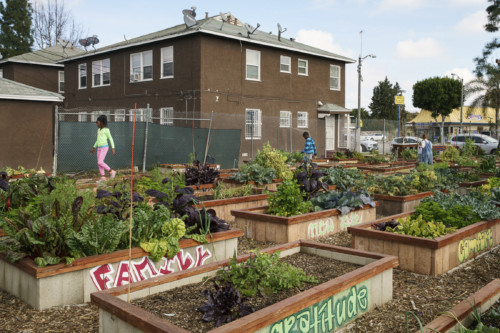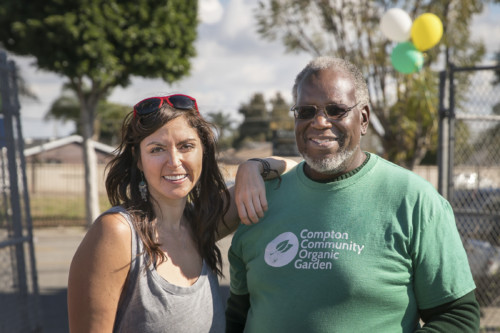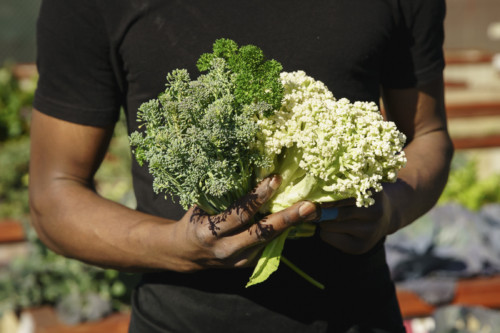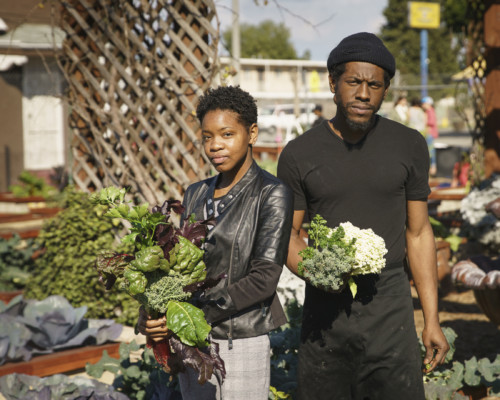
A Party Gardens in Compton
“Here you have killers, prostitutes, people that gang bang, how can you have a garden?” Kenya, a skeptical twenty-something, poses the question in Can You Dig This, a 2015 documentary produced by John Legend that follows a handful of “gangster gardeners” who decide to get their hands dirty in South L.A.’s soil.
On a strip of Long Beach Boulevard that meets Kenya’s description, the garden in question thrives in a formerly vacant lot.
Compton Community Garden is a collaboration between multiple non-profits, ministries, the City of Compton, and the Compton Fire Department. One of the renegade gardeners who tends to it is Sherridan Ross.
While “Los Angeles” conjures a healthy and fit lifestyle, most of the county’s low income communities have a dearth of nutritious, fresh and affordable food. Wielding his seasoned green thumb, Ross, who retired and began gardening full-time years ago, combats this inequity by mentoring local gardeners and providing tools to enable healthy choices.
In the midst of a winter harvest, teaching and angling for more urban garden plots, Ross invited GC to a garden party and made time to speak about food injustice, community, and nutrition.
GC: Before guests arrive, will you tell me about our location?
This vacant lot was converted to a community garden because the area is a food desert. We had one supermarket for every 60,000 people, when generally there should be one supermarket for every 10,000 people. We wanted to show people that they could grow their own food, healthier food. There is also a high percentage of obesity in this area. We put out flyers and told the neighborhood what we were going to do, and we were surprised by the response.
GC: What surprised you most?
This is an area that’s heavy with gangs. We told them, “We know you like to tag things so you can tag any words from the bible.” This place is like a sanctuary for them. Some we teach how to build beds so that they can get out of the situation that they are in. Many get out of prison and tell us they want to get out of gangs. We teach them how to grow vegetables and do public speaking, how to be entrepreneurs so that they can go out and build people gardens.
GC: You mentioned supporters driving long distances to garden here, including the party host. What percentage of the beds are rented by local neighbors?
Fifty percent. Plus those plots along the fence belong to the owner of the land, we barter to use it.
GC: You pay rent in vegetables?
Yes. The owner is from Korea, and last year we planted Korean squash. It was huge, like a pumpkin. His wife did not want to get her hands dirty at first, but then she changed from her high heels to her sneakers and now she comes by with her little dogs and works in the dirt.
GC: Do gardeners receive guidance on how to plant and care for the beds?
Yes. I teach biodynamic French intensive gardening. This means you account for every square inch of space so you get a lot of vegetables out of a small area. On a space this size here, you get enough vegetables to feed a family of three. If you plant a bed of tomatoes, you’re harvesting about 110 pounds of tomatoes a week.
GC: That’s a lot of tomatoes. Do kids also participate?
When I have classes I tell parents to bring their kids because we want to get them started at an early age. [The kids always go for the peas!]
GC: Why raised beds?
This was an old motel car park, and we did not want to risk soil contamination so we built the raised beds. The design came from the internet!
GC: Were your immediate neighbors pleased with the parking lot’s transformation? Do they mind the foot traffic?
There’s a guy who lives in the back who is a little schizophrenic. But his wife tells us that the garden is one of the best things that happen to him. He gets up at 4:30 every morning and makes sure the back alley is clean for us.
Teaching people how to grow their own food, it’s been a godsend. People are happy.
Ruthie Abel
GC: Will you share a garden lesson or anecdote?
People are often surprised by the taste of red tomatoes right off the vine and I love explaining the difference between store bought and garden grown vegetables. Tomatoes in the supermarket come from Venezuela. They are picked when they are green and when they arrive they are gassed with ethylene so that they turn red. But they never truly ripen. That’s why they don’t taste the same as red tomatoes from the garden.
GC: You told us to meet the folks and we’re giving the last word to Timothy Martin, teen mentor and founder of Dedication Catering, an organic vegan company using produce from the Compton Community Garden.
For more information on the Compton Community Garden, visit the organization’s website.














































